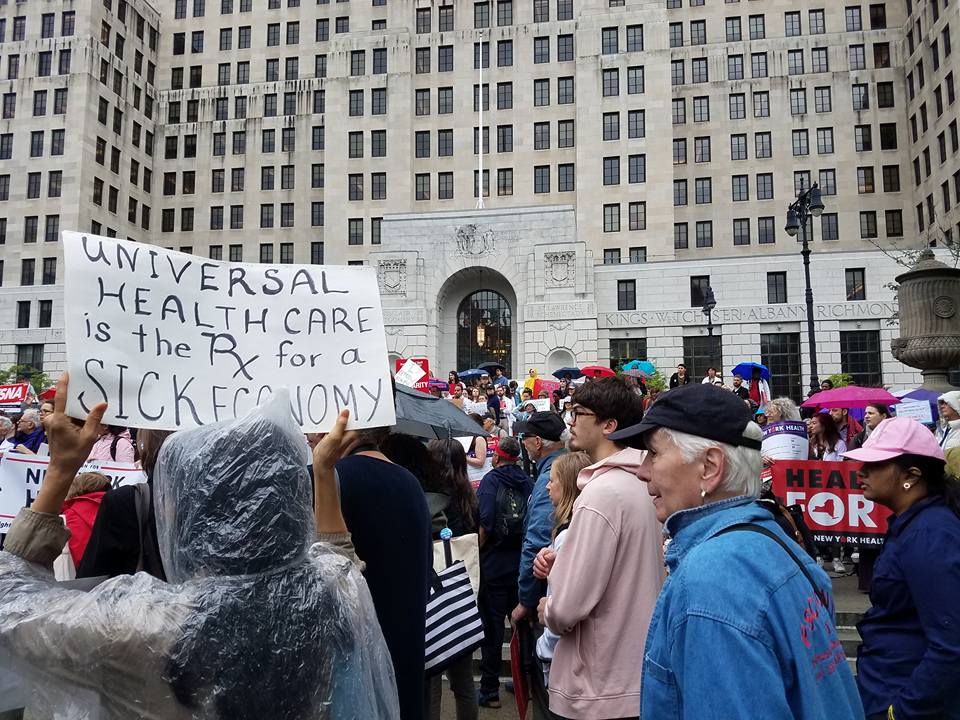Campaigning for The New York Health Act
On June 5, 2018, hundreds of New Yorkers, representing every voting district in the state, rallied in a rainy Albany for Lobby Day, to support The New York Health Act.
The Act aims to provide comprehensive, universal health coverage for all New Yorkers. The Campaign for New York Health, an organization formed by nurses’ unions, physicians’ groups, healthcare providers, patients, families, and community organizations, has been leading the charge for universal healthcare for the past several years. On Lobby Day, healthcare professionals spoke about their direct, daily experience with the heartbreaking failure of our current system.
“You know going into a day like this that you’re going to hear some stories, because you have your own experience of people not being able to access healthcare in a timely manner, or at all,” says Elizabeth Schiavoni, Executive Director of Science Demands Action, who was present in Albany and witnessed the power of people’s stories. “And then you hear it from the perspective of nurses and doctors, and I don’t know how they go into work every day.”
One doctor spoke of a young cyclist who had been hit by a car but did not want the exposed bones of his broken leg set because his insurance didn’t kick in for another two weeks. “This is an issue of who is and isn’t insured, but it is alsoan issue of the system that we have in place not working to provide care to people who areinsured,” Schiavoni said.
After the speeches and rally in the capital plaza, groups split up to speak directly with New York legislators. “The organizers did a really amazing job of making lobby day as effective as possible,” Schiavoni said of her experience lobbying alongside Western New York Healthcare for All, who spoke with representatives about why they had not supported the Act. The lobbying team included not only professional healthcare policy advocates, but also working and retired healthcare professionals, students, and even a local business leader, amplifying the message that universal healthcare is good for the economy. He ran businesses in both Canada and the U.S., and said his businesses in Canada functioned better because of that country’s universal healthcare system.
Many legislators reject universal healthcare with a rhetoric of aversion toward change, claiming that such a drastic overhaul of healthcare would prove unsustainable. Advocates are quick to dispute this claim. “Medicare was implemented without computers in a very short period of time,” Schiavoni points out, and alternative ideas for implementing a new healthcare system, slowly and incrementally, kills people who currently cannot afford or do not have access to care. For some, a story of economic sustainability and success because of universal healthcare may be a more effective argument than stories about the loss of life caused by our current system, rendered ineffective by their ubiquity.
Indeed, “all the research we have, points very clearly to having specific employment circumstances determine access to healthcare stagnates the economy. People are afraid to move between jobs, they’re afraid they will not have access to healthcare, they’re afraid that their kids won’t have access to healthcare. It really stifles innovation,” Schiavoni said.
Based on statistics from the Campaign for New York Health’s website, by overhauling the current, crumbling system, and implementing what is known as a single-payer system, healthcare costs could be 98% cheaper for New Yorkers due to elimination of insurance premiums, co-pays, and network restrictions. State spending would also decrease by $45 billion due to cuts in administrative costs and payments to restrictive insurance companies and pharmaceutical corporations. Everyone, regardless of income, would receive care.
Universal healthcare is important to WNY Healthcare for All and Science Demands Action because it is evidence-based policy. “It’s better for the economy and better for people’s health. It makes more sense for moving healthcare forward as a field for healthcare professionals to actually be able to do their jobs.”
One of Science Demands Action’s advocacy issues is destigmatizing addiction and victims of the opioid epidemic with mental health and public health research. “We would not be seeing the opioid epidemic with a different healthcare system,” Schiavoni explained. “Pills are cheap for insurance companies and profitable for pharmaceutical companies, once people are stuck in addiction, they don’t have easy access to help.”
The New York Health Act would eliminate having to negotiate with insurance companies who currently hold the power. Patients would choose their doctors and have a say in their own treatment. Prescription costs would drop. Access to therapy would be open to all.
Following the success of Lobby Day, The New York Health Act passed in the State Assembly on June 14. This is the fourth year in a row the Assembly has approved the Act, and the next step is the State Senate, where, historically, it has been blocked. The Campaign for New York Health has been tireless in its efforts to gain support from constituents and their representatives, because healthcare is literally a matter of life and death.
If you would like to help, join Western New York Healthcare for All (https://www.facebook.com/wnyHealthAct/) or visit the Campaign for New York Health’s Take Action page (https://www.nyhcampaign.org/action). There you can share your story, request materials, sign up to volunteer, or contact your representative to demand health care for all.


